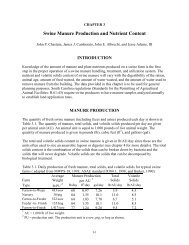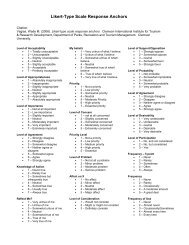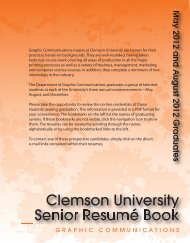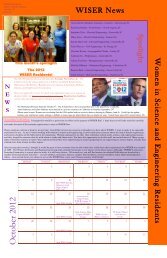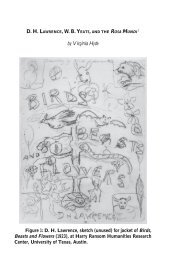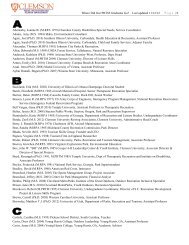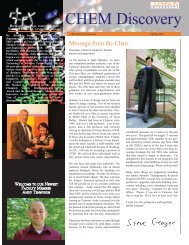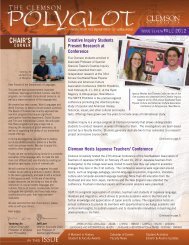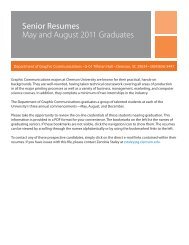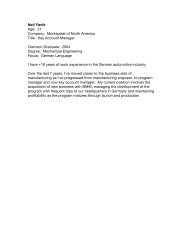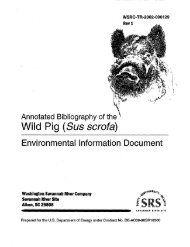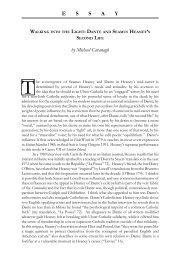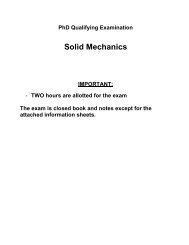Woolfian Boundaries - Clemson University
Woolfian Boundaries - Clemson University
Woolfian Boundaries - Clemson University
You also want an ePaper? Increase the reach of your titles
YUMPU automatically turns print PDFs into web optimized ePapers that Google loves.
24 WOOLFIAN BOUNDARIES<br />
Toulmin’s 1989 invocation of Montaigne, if not his more methodical writing style in<br />
Cosmopolis, would certainly have resonated with a writer like Virginia Woolf, for whom<br />
Montaigne was a major cultural touchstone, though she never lived to see the decade of<br />
the 1960s that proved so infl uential for the English philosopher. Toulmin himself was<br />
born in London in the year Woolf published Jacob’s Room. 6 Technically, with luck and<br />
good health, she might have witnessed with wonder at least the initial years of that notorious<br />
decade of cultural and intellectual upheaval, born as she was in 1882. And it’s hard not<br />
to wonder what she might have said about it (indeed, countless Woolf scholars have been<br />
doing that for years). But it is easy to forget that her husband Leonard—two years her<br />
senior—actually did manage to survive well into the 60s, and to keep writing to boot.<br />
Not unlike Toulmin, Leonard—who was also Cambridge-educated—was something<br />
of a social philosopher who saw fi t to invoke Montaigne later in life in an attempt, it<br />
seems, to heal the wounds of history. Nearly thirty years after his wife’s suicide Leonard<br />
opens the fi nal installment of his fi ve-part autobiography in a chapter titled “Virginia’s<br />
Death” with a discussion that leads to the French inventor of the essay form. In fact,<br />
Leonard had even chosen to title that 1969 volume with a paraphrase from the Essais that<br />
he and his wife had both used in various manifestations to describe one of Montaigne’s<br />
most important lessons for them: Th e Journey Not the Arrival Matters.<br />
We might wonder what would prompt Leonard to use a Montaignian message to<br />
name and to begin the end of his autobiography in 1969. Perhaps, nearing ninety, he<br />
identifi ed even more closely with the Frenchman in his library, in retreat from the world.<br />
Indeed, the 67-year-old Toulmin might have felt this way as well when he penned Cosmopolis,<br />
or again in 2001 when he, at 79, reiterated his campaigning on behalf of Montaigne<br />
as philosopher in Return to Reason (of course, we must remember that given the<br />
shorter life spans common in the sixteenth century, Montaigne considered himself elderly<br />
and deserving of peaceful “retirement” by his late forties). But Leonard might also have<br />
been thinking of the reverence he shared with his late wife for this Renaissance writer,<br />
whose home they had visited in 1931, right before Europe began the second phase of its<br />
rapid decline. Toulmin himself even waxes (Virginia) Woolfi an—as best he can—when<br />
he recounts a visit to the great essayist’s tower later in life in the penultimate chapter of<br />
Return to Reason.<br />
Another compelling explanation for Montaigne’s presence in this opening chapter<br />
of this closing book has to do with the Frenchman’s position for the atheist Leonard as<br />
a sort of secular savior fi gure, indeed, a prophet who, if duly heeded, might have saved<br />
Europe and perhaps even Virginia from the demise Leonard describes so despairingly in<br />
these opening pages.<br />
Leonard’s begins his chapter titled “Virginia’s Death” from a decidedly un-Montaignian<br />
impersonal and historical distance by dating the outbreak of the “second of the great world<br />
wars” and giving a rough psychological map of England at the time (9-10). Virginia is fi rst<br />
mentioned more than fi ve pages into his narrative when Leonard tells how her brother<br />
Adrian, horrifi ed by the prospect of the new confl ict, had off ered poison to his sister and her<br />
husband so that they might commit suicide if brutal war should come again (15).<br />
Leonard speaks rather drearily and again impersonally of the profound eff ect the<br />
years 1933-45 had upon the communal psychology of his world, “the world,” he writes<br />
shifting unsubtly into the fi rst person “in which I have had to spend my life” (17, emphasis



